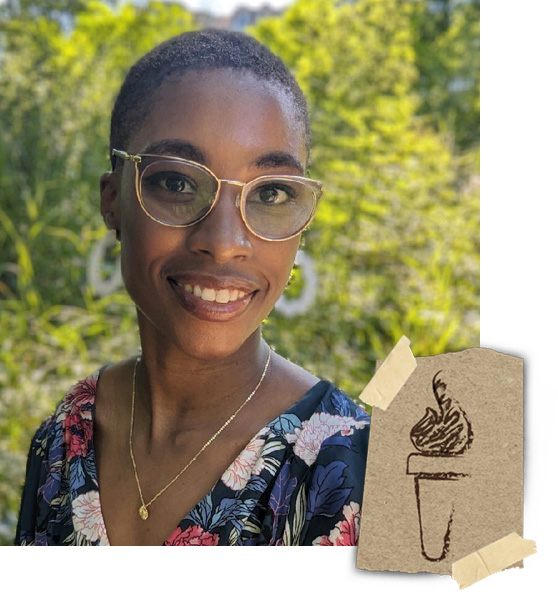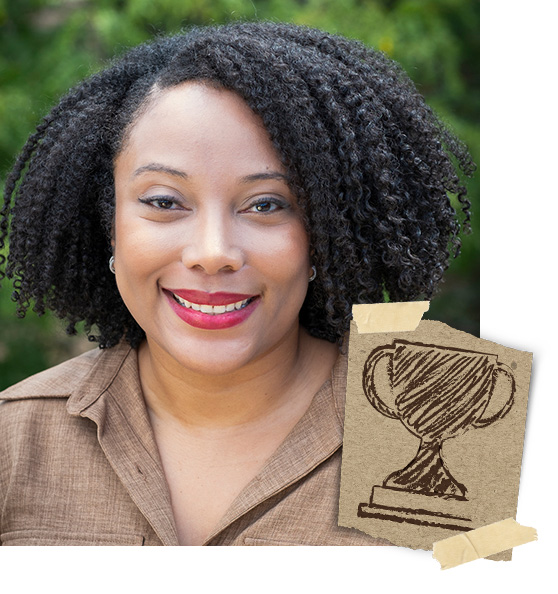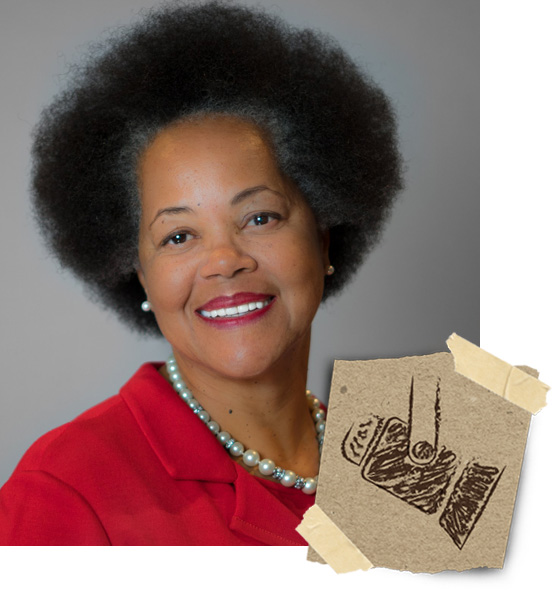Access Torch: Danielle Cadet
February 7, 2025 - Emily Jodway
 Our Access Torch for the month of February is Danielle Cadet, a second-year PhD student in the Department of Human Development and Family Studies (HDFS). Cadet holds a degree in Sociology from Bryn Mawr College and a Master of Education in Learning & Design from Vanderbilt University. As an individual who has dedicated much of her research toward analyzing social inequities and identifying ways to implement change, particularly among students from marginalized communities, she is a perfect scholar to highlight as we celebrate Black History Month.
Our Access Torch for the month of February is Danielle Cadet, a second-year PhD student in the Department of Human Development and Family Studies (HDFS). Cadet holds a degree in Sociology from Bryn Mawr College and a Master of Education in Learning & Design from Vanderbilt University. As an individual who has dedicated much of her research toward analyzing social inequities and identifying ways to implement change, particularly among students from marginalized communities, she is a perfect scholar to highlight as we celebrate Black History Month.
Cadet is a native of New Jersey, but also spent time during her childhood in Boston. Throughout several family moves, Cadet found the place she could consistently rely on and feel grounded within was school. “It was so nice that, no matter where I moved, there was always a library,” she explained. “I was able to always rely on school and the library space as a place for confidence and security.” With education as her anchor, Cadet fell into a love of writing and was very interested in neurodiversity and psychology from a young age.
Upon arriving at Bryn Mawr College, Cadet herself had prior knowledge of politics, current events and activism; however, for the first time, she had the opportunity to reflect critically on her gender identity. As a young Black girl from Jersey, and a first generation college student, things like identity politics were a familiar concept to her, but moments to think about her identities deeply were limited.
“Bryn Mawr was the first time I had the opportunity to really sit with myself as someone stepping into Black womanhood and really think about what gender means to me and how I navigate the intersections of race and gender, and to this day, that still informs much of my work,” she added.
After gaining more confidence in her academic abilities and earning her master’s degree at Vanderbilt, Cadet eventually began looking into potential PhD programs. “I’m a big cold emailer,” she said, in reference to the many emails she sent out to schools throughout her search. After a successful cold lead, she received a recommendation to check out the MSU HDFS program and Dr. Deborah Johnson, who eventually became her advisor. Cadet was looking to further research on social and cultural understandings of development and the human experience, and felt that HDFS would be a great way to continue with her interests from a more interdisciplinary lens.
Cadet has been involved in several different projects during her time at MSU. Before pursuing her PhD, she spent time creating instructional curriculum with various pre-college programs. After coming to MSU, she began working with Upward Bound, a national education program for secondary school students preparing for college and beyond. With this background, she has continued to research critical consciousness development and ways to help students enhance their critical thinking skills and prepare them to address complex societal issues. One such project she is working on with the MSU Future Academic Scholars in Teaching (FAST) program involves research on social empathy and critical consciousness development amongst undergraduate students, and creating tools that professors can use to educate students on these ideas.
“We are looking at what course content they should be implementing to instill transformative social empathy in students,” she explained. “In this way, it would help them internalize some of the theories they’re learning in class. They’ll think about theories not just as something to memorize, but as a way to change the world around them.”
She is further developing this research in her dissertation, looking specifically at how ecological factors like how one’s family experiences prior to college may inform their ability to participate in and get the most out of college courses.
Cadet particularly enjoys working hands-on with students in the community, and oftentimes draws upon her own experiences when working with students facing extra hurdles coming from a diverse background. Many of these students face barriers to navigational capital, or the ability to navigate social institutions, especially if they come from a lower socioeconomic background or don’t have any relatives who attended college.
“Speaking from my own experience, sometimes you just don’t know where anything is until you get [to campus.] So I try to teach students some things they can do instead, like being proactive, planning and sending those cold emails. Here’s what you can do so that you are still able to do what you want to do, even if you don’t know any doctors, no one at your Thanksgiving table has a PhD, here’s how your cultural capital can be leveraged to your benefit.”
Additionally, she is a great proponent of upholding researcher responsibility, and working with individuals to understand their wants and needs rather than only garnering information from written studies or news clips. “It also ensures that the interventions, all the ideas that I have, are actually relevant to current experiences, because sure, I can keep up with the latest literature, but there’s nothing more current than just sitting down with a student and hearing about their day.”
Cadet credits much of her success to her support system at MSU. Drs. Deborah Johnson, Rome Meeks, and Desiree Qin, all professors in HDFS, have been invaluable to her throughout her journey. She also finds camaraderie and likeminded individuals through FAST and the Alliance for Graduate Education and the Professoriate (AGEP). “I think these spaces are good at having that competitiveness and rigor that I found at Bryn Mawr and Vanderbilt, but because we’re so much like family, it doesn’t feel like we’re in competition- it feels more like we’re all rooting for each other,” she explained. “People here are so excited about different ways to work with the community and be socially responsible when doing so.”
Cadet describes the HDFS program as a whole as an interdisciplinary group that has their own set of theories and theorists but who also draw upon anthropology, psychology, education, and other fields to inform their research. “For me, HDFS is really driven more by the passion rather than the disciplinary boundaries,” she said. “The passion for understanding how people show up in spaces, and their own ways of knowing, and having that ecological understanding of things like family and community systems and how they can inform who you are.”
This idea of ecological understanding also plays into how Cadet approaches her own recognition of Black History Month. She sees not only this month, but every day of the year as an opportunity to educate oneself and others on the storied history of Black individuals in America. “We’re part of a global diaspora that has contributed so much to contemporary society in ways that we’re still learning about every single day,” she said. She also encourages carving out space to learn about the various intersectionalities that create unique experiences and outcomes for everyone. “Looking at ability, socioeconomic situation, geography, spirituality, ethnicity … how do all these things also inform Black experiences?”
Honorees’ views are their own and do not necessarily reflect those of the College of Social Science.
Read more:

Access Champion
Faculty/Staff
Dr. Monique Kelly
Our Access Champion for this month is Dr. Monique Kelly. Dr. Kelly is scholar-educator whose work focuses on racial and ethnic stratification and inequality.

Access Spotlight
Alumni
Karen Schrock
Ms. Schrock, a double SSC alumnus, with a bachelor’s in psychology and a masters in criminal justice, was past president and CEO of Adult Well-Being Services, and is presently, board member of Detroit’s non-profit, Metropolitan Organizing Strategy Enabling Strength (MOSES).

Access Matters
We strive to cultivate an inclusive and welcoming college environment that celebrates a diversity of people, ideas, and perspectives.

